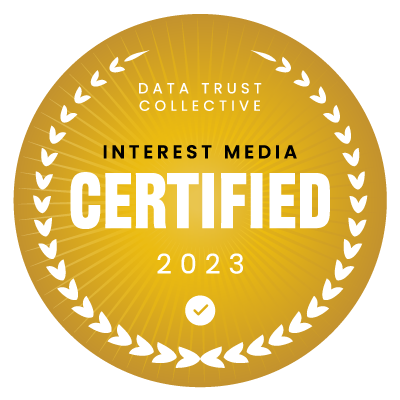
Google is Phasing Out Cookies
- Big tech has to face the fact that people want privacy and Google rolled out a new Chrome feature to restrict third-party cookies by default in Jan. 2024.
- For advertisers, the end of third-party cookies appears to be more of an opportunity than a significant setback.
- First-party data is the new way forward and Interest Media can help advertisers use first-party data to reach prequalified, engaged audiences.
What are third-party cookies?
Most marketers already understand what third-party cookies are. But for the uninitiated, “third-party cookies” are a small piece of data that is placed on a user’s device (smartphone, tablet, computer). The cookies are placed there by a website that is different than the one the user is currently visiting. The cookie tracks the user’s browsing history, which enables personalized ads that are served based on their activities.
Why is Google Ending the Third-Party Cookies?
“Google Chrome had 64.17% of the browser market share as of October 2023,” –Yaguara.co
Consumers are concerned that third-party cookies use their personal data in a way that invades privacy. More and more governments and localities agree, with increasing restrictions and measures being passed into law to protect consumer privacy.
SEO and the future world without cookies – Timeline: Tracking Restrictions 2018–2023 – Search Engine Land
Google is seeking to phase out third-party cookies in its Chrome web browser in 2024. Google plans to create a privacy sandbox with open standards for tracking users while still protecting their privacy. The initial blocking of third-party cookies for 1% of users beginning in January 2024 will serve as a test to measure the impact of blocking cookies in the marketing industry.
With Google ending third-party cookies, it’s going to affect the majority of all Internet users, as Google’s Chrome browser is used by 64.17% of people globally. By comparison, the other largest shares in the market go to Apple Safari at 19.62%, Microsoft Edge at 4.87%, Mozilla Firefox at 2.92%, and Samsung Internet rounding out the Top 5 at 2.54%.
Google is well aware of the issues it may cause for advertisers, but also the average user.
“Third-party cookies have been a fundamental part of the web for nearly three decades,” a Google spokesperson said in a statement. “While they can be used to track your website activities, sites have also used them to support a range of online experiences — like helping you log in or showing you relevant ads.”
“As we introduce Tracking Protection, we’re starting with a small percentage of Chrome users so developers can test their readiness for a web without third-party cookies,” Google’s spokesperson added.
What is Google’s Tracking Protection Tool and what does it do?
Google’s Tracking Protection Tool is a setting in its Chrome browser that allows you to turn “Do Not Track” on or off. You can learn more about how to use this feature on Google’s support page.
Essentially, this feature sends a request to websites not to collect or track your browsing data. Unfortunately, Google seems to imply that this doesn’t necessarily guarantee these websites will honor your request. Google states:
“What happens to your data depends on how a website responds to the request. Many websites will still collect and use your browsing data to improve security, provide content, services, ads and recommendations on their websites, and generate reporting statistics.
“Most websites and web services, including Google’s, don’t change their behavior when they receive a Do Not Track request. Chrome doesn’t provide details of which websites and web services respect Do Not Track requests and how websites interpret them.”
Google allowing some sites to delay the phase-out of third-party cookies
Google is allowing some eligible websites to delay the phase-out of third-party cookies. However, they have to meet Google’s strict eligibility requirements, and advertising-related services won’t gain approval. Ditto for domains, and even subdomains, that are known for advertising. Mainly, sites eligible for approval will need to show a direct impact on end-users.
How Will Cookie Deprecation Affect Web Users?
Users who are among the first 1% to have third-party cookies blocked by default will receive a notice when they open Chrome on either their desktop or Android devices.
In some instances, when there are issues, such as causing the user to refresh a page multiple times. Chrome will prompt the user to temporarily re-enable third-party cookies by clicking the eye icon on the address bar’s right side.
Concerns for marketers: Take action now
Marketers who rely heavily on targeted advertising with third-party cookies will need to prepare to utilize alternate tactics. Google plans to completely retire third-party cookies in the latter half of 2024. Therefore, marketers must take action now.
Why Ending Cookies is a Good Thing for Advertisers and What to do Now
There is no doubt that the end of third-party cookies and Google Chrome will be a paradigm-shifting change for the marketing industry.
The fact of the matter is that third-party data has lots of fuzzy areas when it comes to being truly privacy-centric.
Marketers will need to take a privacy-first, consumer-centric approach with new methods. The good news is that these new methods appear to offer a greater opportunity that promises to yield even better results.

First-party data is the way forward
The way forward appears to be moving toward a first-party data strategy. This approach removes a lot of the complexity and concerns surrounding third-party data.
More so, first-party data has significant value due to the close relationships it creates between customers and brands. One immediate benefit is that first-party data provides stronger and more accurate information from customers. First-party data signals greater interest. It allows you to build better customer profiles, as well as create more accurate audience segments.
Interest Media can Help You Reach Engaged Audiences with First-Party Data
Interest Media allows you to create meaningful interactions with actively engaged audiences that have confirmed their intent and fit your precise consumer profile. These authenticated customers have been pre-qualified and are ready to engage with your brand.
Interest Media has become an industry leader in providing data-driven results for advertisers by engaging consumers through a network of owned and operated web properties that boast over 100 million fully registered consumers, all ready to take action.
Find Your Ideal Consumers
Acquired with absolute precision, utilizing first-party data and consumer insights, Interest Media attracts high-value customers showing a clear connection to your brand. Advertisers are given the ability to reach these ideal customers within niche audiences, paying only for real conversions.
Request a Demo
Take a moment to fill out the form below and one of our brand promotion specialists will get right back to you. We pride ourselves on being able to bring advertising partners the exact consumers they’ve been looking for, and we can’t wait to show you how it works.













